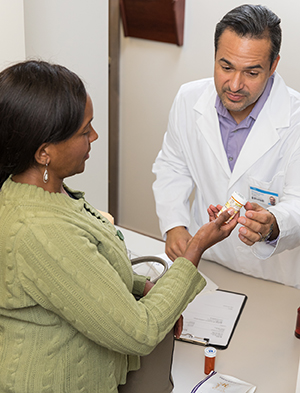Taking Your Medicines After a Heart Attack
You'll likely need to take several types of medicines after a heart attack. You may wonder: Do I really need to take so many medicines? The answer is yes. Medicine can be a vital part of healing. They can also help prevent another heart attack in the future. Be sure to take all medicines as directed.
Getting started

-
Keep a list of all your medicines. Know what they are, what they do, what happens if you don't take them, and how to take them. Keep that list with you at all times.
-
Know what side effects to expect. If a side effect bothers you, doesn't go away, or gets worse, call your healthcare provider.
-
Ask your provider or pharmacist about possible interactions between medicines. Check before taking any over-the-counter medicine, herbs, or supplements.
-
Try to get all prescriptions filled at the same pharmacy. This will help reduce the risk of interactions between medicines.
-
Talk to your provider if you have any concerns about the cost of medicines. A lot of pharmacies offer free or low-cost prescriptions for generic medicines. It's important that you take all of them or find alternatives if you can't afford them.
Types of medicines
-
Antiplatelet and anticoagulant medicines. These help prevent blood clots.
-
ACE inhibitors or ARBs (angiotensin receptor blockers) . These help control blood pressure and reduce heart strain and weakening of the heart muscle. They also help with heart remodeling and lowers risk for future heart attack.
-
Statins. These help reduce cholesterol levels.
-
Beta blockers. These help slow the heart rate and lower blood pressure. They can also help the heart pump more effectively.
-
Nitroglycerin. This helps reduce the heart's workload and improves blood flow through the heart.
Hints for taking medicines
-
Use a pillbox to store all the pills you need for the week.
-
To be sure you don't skip or repeat a dose, write down when you take your medicine.
-
Consider downloading a medicine app to your smartphone.
-
Don't stop taking your medicines. This can be dangerous to your heart.
-
Be sure to refill a prescription before it runs out.
-
Take your medicines at the same time every day.
-
Be sure your healthcare provider knows all your medicines you are taking. This includes over-the-counter medicines and supplements.
-
Talk with your healthcare provider about your medicines and possible side effects. Let your provider know if you have any side effects. They may change the dosage or schedule to reduce effects. Your feedback will help the healthcare provider find the best medicine plan for you.
Medicines for related conditions
-
Blood pressure medicines. High blood pressure is one of the most serious risks for heart attack. Medicine is likely needed to help manage this problem. It might take time to find the best medicine for you. For best results, follow these tips:
-
Don't stop taking high blood pressure medicine suddenly. This can make your blood pressure shoot up quickly.
-
Keep in mind that medicine works best when you're also eating heart-healthy foods, limiting sodium (salt), and getting regular exercise.
-
Diabetes or high cholesterol medicine. If healthy eating and physical activity aren't enough to manage these conditions, your healthcare provider may prescribe medicines to treat them. Be sure to take them as directed
Online Medical Reviewer:
Callie Tayrien RN MSN
Online Medical Reviewer:
Stacey Wojcik MBA BSN RN
Online Medical Reviewer:
Steven Kang MD
Date Last Reviewed:
3/1/2022
© 2000-2024 The StayWell Company, LLC. All rights reserved. This information is not intended as a substitute for professional medical care. Always follow your healthcare professional's instructions.